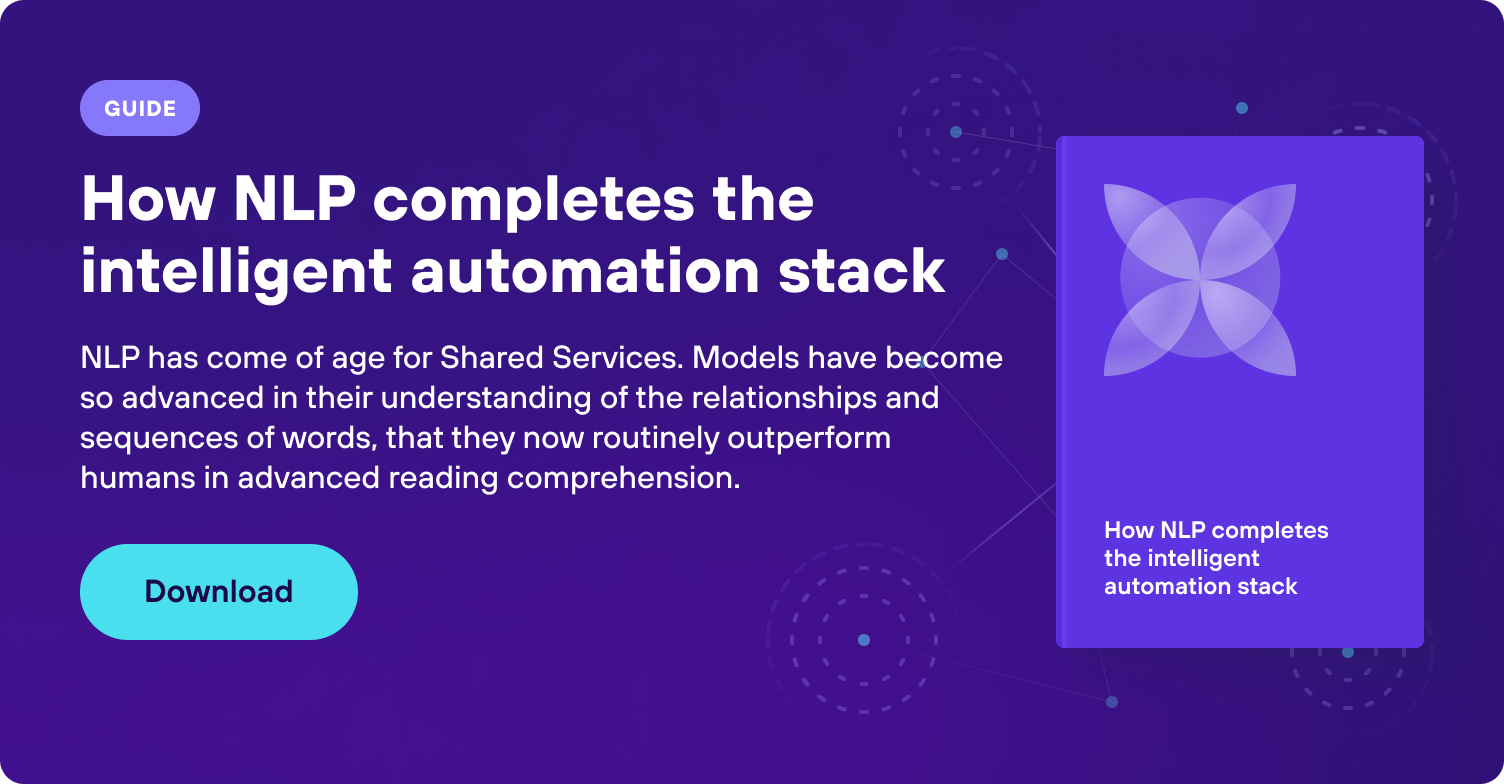In the wake of the pandemic, shared service leaders are under pressure to hit ambitious efficiency targets and boost agent productivity. Manual email processing has been identified as a time and resource sink for shared services, but a lack of visibility into the problem makes the process difficult to analyse or automate. Fortunately, recent advances in natural language processing have made the technology a powerful enabler of efficiency and productivity.
Business as usual isn’t coming back. Remote and hybrid working means there are more new tools and cloud-based services to contend with, and that means more employees seeking help from shared services agents. This trajectory will only continue as businesses are expected to grow their cloud spending by 21% over the next year.
Of course, shared and global business service leaders need to hit their targets - that’s always been a top concern. But there’s increasing pressure for departments to create new value and provide entirely new services to employees across the enterprise. The most competitive companies are able to adopt new tools and applications rapidly, and it’s up to core business functions - everything from Finance to IT - to ensure that happens.
Shared services help the business to run efficiently and competitively. But who’s helping shared services agents work at their best? An agent’s work is based in email communications - across core business functions, the average employee sends or receives 126 emails a day, with 40% of their time spent in Outlook alone.
Much of this is critical work, but a great deal of time is focused on low-skill, time-consuming tasks like requesting information or triaging emails between different teams.
Time stuck in your inbox is rarely time well-spent. Manual email processing is a cost centre, a drain on resources and, often, a driver of staff churn. It’s important for shared services leaders to address this challenge, but they’ll need to look beyond the familiar tools of process excellence, programme management and automation to do it.
An answer to the email challenge
After a prolonged focus on Cloud as an enabler of work, RPA has emerged as the decisive tool for digital transformation. A majority (69%) of Global Business Service leaders consider it their core focus over the next three years. However, while RPA will no doubt drive crucial process improvements, how will it tackle the cost of email?
RPA is designed to mimic and perform the actions of humans in a business. This frees agents from unskilled work to focus on value-add. However, RPA software robots can’t yet think like humans or process information like we do. They rely on the clean, structured data that exists in documents and spreadsheets. This makes them unsuited to processing emails, where understanding the free-form, complex language that humans use is critical to performing the right action.
An RPA solution could certainly send, reroute or delete an email - but there’s a crucial gap in understanding that needs to be crossed first. The leading shared service leaders are starting to bridge this gap with natural language processing (NLP) solutions. NLP is designed to understand the complex natural language of humans, converting it into structured data that can then be actioned by the business. This makes it ideal for email and communications-based processes.
NLP has long been a fixture of the front office, where it helps chatbots and other customer-facing technologies understand masses of customer queries and requests. However, the technology has advanced to such a degree that critical business processes can now run on it. NLP can be deployed safely and reliably, helping shared service leaders understand and then streamline any email or comms-based process.
NLP in action
NLP is only one of many tools needed to drive digital transformation in shared services. However, what makes it a game-changer is how it extends analysis and automation into business conversations for the first time. When working alongside RPA and other automation solutions, it’s fully capable of taking over repetitive email-based tasks and triggering the appropriate responses to inbound service requests.
This could be transformational for agent productivity. Instead of responding to routine requests on email, or forwarding a message to the right team member, they can focus on resolving complex issues deserving of their time and expertise. Efficiency gains in one area of shared services quickly spreads. Not having to deal with routine email tasks means that even the most challenging request can be dealt with more quickly. Handling times fall across the board and targets are hit more quickly. Agents also win back precious time, giving them the capacity to provide new, value-adding services to the business.
However, there are also dividends for operational insight and intelligence. Other tools can help to work out how efficient a process is, but only NLP enables you to understand what is triggering that process. By analysing communications data en masse, NLP helps shared service leaders see what service requests are creating the most workflows and taking up the most time. This valuable insight can inform and feed into everything, from hiring decisions to more effective capacity planning.
NLP has finally matured as a technology and is coming into its own in the back office, as a powerful productivity tool and driver of operational awareness. Alongside RPA, it’s critical for achieving digital transformation, giving time back to staff, and helping shared services become centres of excellence and innovation.






